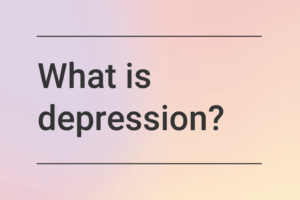Depression can be a very frightening and isolating experience. It can feel like you are stuck in a dark hole with no way out. The good news is that there is hope. In this self-help guide, we will discuss 11 steps that can help you recover from depression. If you are struggling with depression, please don’t hesitate to reach out for help. You are not alone.
Contents
Defining Depression
 Depression is a widespread and serious medical problem that affects how you feel, think, and act. It makes you feel sad and lost in life. This emotional condition is characterized by low mood, sadness, and an inability to enjoy activities you previously enjoyed. It can cause a slew of physical and emotional issues as well as decreased productivity at work and at home.
Depression is a widespread and serious medical problem that affects how you feel, think, and act. It makes you feel sad and lost in life. This emotional condition is characterized by low mood, sadness, and an inability to enjoy activities you previously enjoyed. It can cause a slew of physical and emotional issues as well as decreased productivity at work and at home.
Why Handling Depression Seems Tough?
It is a natural part of life to feel down or sad. People disappoint us, events go wrong, and we lose loved ones or cherished aspirations. When sadness persists over weeks, months, or years and prevents you from interacting with people or having fun in your life, you’re probably dealing with depression.
Even severe depression is treatable if you have access to knowledge, medical practitioners, and support networks in your community. However, take matters into your own hands and do something if you are sad.
Self Help For Depression
You can treat depression by yourself with some fruitful methods. Yes, there are several ways available with the help of which management of depression is possible. Self-help for depression might help you overcome the disorder permanently also. The reason is that you can tackle your problem in the best manner as anyone else. The right strategies with correct execution are required to get rid of the issue. Some major self-help solutions are as follows:
Be Aware Of Symptoms
You can diagnose at your own home yourself whether you are going through depression. The method is simple. You have to keep an eye on warning signs of depression. Furthermore, you can educate yourself more about the rising disorder with deep research through various online resources. It will help you get a better understanding of the issue so that you can seek the right remedy possible for the cure.
It’s critical that you get help for your depression as soon as possible and that you don’t attempt to go through this alone. Depression has a variety of typical symptoms. If any of the following expressions describe you, consult with your doctor: Signs of depression include:
- An inability to carry out basic daily tasks.
- Feelings of isolation and the deterioration of interpersonal bonds with friends.
- Disinterest in things you used to enjoy, such as reading, video games, drawing, and so on.
- Sleep disturbances include tiredness and fatigue.
- Self-rejection and feelings of low worth are common.
- Lying down in a confined space for a long time.
- Being awakened frequently during the night, or experiencing sleeplessness.
- An increase in weight, eating more than usual, or loss of appetite.
- Pessimism, or the belief that life is meaningless and futile.
- Pain in your joints, muscles, vertebrae, or ligaments. These might happen “for no apparent reason.”
- Suicidal ideas, ideas about suicide, and suicide attempts.
Research On Disorder
- Discover what you can do about depression. You may overcome your condition by supplementing your knowledge of it. Knowledge is a powerful tool for reassuring yourself that depression exists and that it must be taken seriously. A greater understanding of depression will provide you with a variety of strategies to try on your own.
- You can visit your local library and pick up books on depression, worry, and happiness. Look in the psychology, self-help, therapy, and medical sections of your local bookstore for titles about mental health. Look at book sites to find inexpensive publications about mental health for kids
- Bibliotherapy is the use of books to assist with depression recovery. If you’re motivated enough to take this path to heal, it can be truly beneficial. This approach appears to be well-suited for individuals who rely on research as a method of resolving any difficulties they may be experiencing in their lives.
Try Natural Therapies
Some natural therapies can be beneficial as healing alternatives. They help restore your emotional equilibrium. Some useful therapies are:
- Music is a type of self-help therapy that has been shown to alter emotions. Choose music that will make you feel better. If you must listen to sad music, change tracks after a few songs.
- Another popular alternative therapy for sadness is art therapy. Draw, paint, or make patterns that express your emotions on a canvas or paper. If required, qualified art therapists can assist you.
- Pet therapy might be helpful. Pets keep people from feeling lonely and unloved, and they don’t pass judgment. People who are depressed benefit from being with animals because studies have shown that they create a sense of well-being. Even if you don’t have a pet of your own, try to get access to someone else’s frequently and spend time with them.
Bring Lifestyle Changes
Bringing new positive lifestyle changes will give a new outlook to your life. Inculcating such new changes will improve your health and life due to which you feel better.
Sleep well
A good amount of sleep is critical to a healthy body. Sleep deprivation may lead to negative thinking in which your pessimistic thoughts keep you up and prevent you from getting enough rest. Waking up feeling exhausted and unrefreshed is a common problem during the depression, and even too much sleep might make depressed people feel worn out. Hence, ensure your quality sleep regularly.
Avoid Distraction
Sticking to the same bedtime and waking time every day requires a breakup from caffeine and alcohol. Furthermore, try to avoid any stimulated activity three hours before bed, remove anything distracting from your bedroom, and maintain a comfortable room temperature.
Exercise
Exercise stimulates the release of a natural anti-depressant chemical in your brain and encourages you to get active. Begin by taking a stroll around the block or across town; then try going for a walk in your neighborhood or around the block. Work up to an activity that meets your demands and enjoyment levels over time.
Eat A Healthy Diet
Reduce your sugar, high fructose corn syrup, fast foods, and processed meal intake. Increase fruits, vegetables, and whole meals in your diet. Beneficially improve your diet if you’re suffering from depression. Furthermore, many nutritious meals are effective at boosting mood.
Groom Yourself
When you’re sad, it’s easy to neglect your appearance and clothing. Regaining a daily routine of grooming might help you feel better and increase your sense of well-being. Get a fresh haircut or new wardrobe to brighten yourself up. Instead of dwelling on what you don’t like about yourself, concentrate on the aspects that you do appreciate.
Keep Occupied
Being occupied is a method to keep bad thoughts from circling in your mind over and over. The first step for depressed individuals may be the most difficult, therefore forcing yourself to do things might make a significant difference in your day and get you started. Introduce structure into your everyday routine. Make a timetable of what to do every day, no matter how uninteresting, and gradually extend it as you begin to feel better. It doesn’t matter if you work or not. A schedule may help put some purpose into a day that might otherwise be aimless or aimless.
Maintain A Good Network
People who love you are an important aspect of the healing process. Tell people you can trust that you’re sad and would appreciate their compassion and understanding. It’s considerably more difficult for folks to assist you if you’re secretive and do things that appear entirely inexplicable. Knowing will enable others to make allowances for your condition, which will be much appreciated.
Spare Some Me Time
You live your best when you regularly spare time for yourself also. If you do what makes you feel happy, you remain stress-free and live your life to the fullest. Some tips in this regard are:
Love Yourself And Have Fun
Do fun things and treat yourself. Spend some time doing things you enjoy. Get involved in it completely. It doesn’t have to be expensive or difficult. Start gradually. One enjoyable thing each day, such as viewing a favorite comedy or reading a hilarious book, can provide you with a sense of humor for a while.
Watching comedy sketches or TV shows make you chuckle and learn how to savor each moment a little more. Make a schedule for the wonderful occasions in your life. Take your full time. If you used to like gardening, start with a single plant. If you liked taking long walks, take a little stroll instead. Increase the number of pleasurable activities over time.
Start A Journal
Make sure to document your emotions in a personal and completely private location. This will be the site where you can freely express your darkest thoughts because you won’t be concerned about being judged for them. Because it eventually supplies you with powerful evidence of what improves your mood as well as what lowers it. A diary may become your depressive companion in the fight. If at all possible, try to write in it every day.
Change Your Mindset
Recognizing and overcoming toxic thinking patterns is a vital element in improving your self-confidence. Every idea generates a feeling, and every feeling generates a behavior. There are a few things to bear in mind:
- Recognize that the feeling will go away. This is a difficult stage, but it’s crucial because it helps you to start stamping out thoughts of hopelessness.
- List all of your outstanding features. It’s easy to minimize the positive aspects of yourself when you’re sad. By listing everything excellent about you, turn this around. Include accomplishments from the past and aspirations for the future, however modest or uncommon they may seem.
- Self-acceptance is an important step in overcoming depression since you realize that you have assets but also acknowledge that you face obstacles. This stops you from comparing yourself to others.
- Make little decisions, however big or little they may seem, and carry them out. While this is usually difficult to do while depressed, it is an important component in coping with the feeling of helplessness that often overwhelms persons suffering from depression. Getting out of bed, calling friends, and cleaning up the kitchen all add up when made into accomplishments.
- Focus on Inquiring about things like Is it possible that I’m prejudging the worst? Is it because something terrible has happened that I’m condemning myself? Is my attention focused on my shortcomings rather than my strengths?
- Learn assertiveness. After you’ve beaten the more difficult elements of your negative thinking patterns, use assertive techniques to find a route to standing up for yourself without succumbing to feelings of anger, fear, or powerlessness. Knowing how to assert oneself is an important part of not falling back into depressive cycles in the future.
Look For The Good
Take a moment to focus on the positive things in your life. Whatever it is, it’s something worth looking for. Keep this list up to date and return to it regularly. It should develop as time goes by and you begin to rediscover the more enjoyable aspects of life again.
- Replace negative ideas with positive recollections of the past. You have complete power over what you’re thinking about. Decide to focus on the good, happier memories rather than the unpleasant ones.

- Change the way you talk. Change the language you use to help yourself look at things more positively. This transforms a negative into a positive by saying “at the very least…,” for example. Rather than feeling regret and believing that they are a failure, ask yourself, “What have I learned from this situation?”
- Accept that depression may return. If you’re not careful, depression can sneak back into your life if you don’t address its causes. Recognize the warning signs and take appropriate measures to deal with them as soon as possible rather than allowing them to get out of control. Reduce its influence and duration as much as feasible.
Begin With Small Steps
- Create a soothing environment. Remove anything from your life that makes you upset or lowers your mood. It might be as easy as ridding yourself of clutter or as difficult as rebuilding the house. Get rid of the stale air in your home by opening windows and bringing in the fresh air. Let nature’s beauty wash over your inside existence.

- Allow everyone in your family and even close friends to assist. You may be ashamed at first, but keeping your depression a secret from those who care about you might deprive you of a valuable support system. You may be pleasantly surprised by how many individuals comprehend what you’re going through.
- Pray to discover peace where you are. It might be a church, temple, or mosque, but it’s still important to go somewhere quiet and serene.
- If you’re bored out of your mind, try to work with others. Helping your family or neighbors will provide serenity for you.
- Red flowers in your bedroom will uplift you and keep it clean.
- Keep away from dark places; spend ten minutes in the sun if you reside in a gloomy climate. At the very least, go for a walk to take some air.
- Set a goal for yourself to be grateful. Tell others you meet how grateful you are – about anything! That you’re still alive, that you have a house and clothing to wear, food to eat, etc.
- Make a hobby. Learning how to play the guitar, taking dance classes, or undertaking singing lessons are just a few examples. Keep your mind busy with pleasant thoughts.
- Avoid going to locations where you’ll be exposed to harmful people who make you feel bad.
- It’s really important to talk with your close friends and family if you’re going through something.
Conclusion
It is concluded that self-help is a good and effective way to treat depression. There are many self-help books and guides available that can help you recover from depression. But please remember that self-help is not a replacement for professional help. Depression is a serious disorder and self-help may not be enough. If you feel like your condition is serious, please seek professional help. However, self-help can be a great complement to professional treatment and should be the first call for aid.
If you are struggling with the problem, know that you are not alone. Millions of people suffer from depression every day. But there is hope! With the right tools, you can recover from depression and lead a happy and fulfilling life. Don’t spoil your life with self-loathing, self-pity, and despair. Take charge of your life today!
For more information, please contact MantraCare. Depression is a mental illness characterized by persistent feelings of sadness, hopelessness, and loss of interest in daily activities. If you have any queries regarding Online Depression Counseling experienced therapists at MantraCare can help: Book a trial Depression Therapy session









